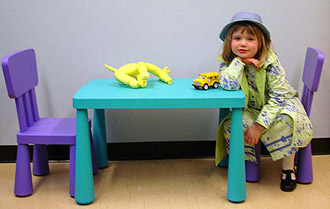
Dr. Birch received her Ph.D. from Yale University in 2004 with a specialization in cognitive science, social cognition, and human ontogeny.
Her over-arching research goal is to better understand how children and adults make inferences about other people’s mental states, or perspectives. And importantly, how one’s abilities, and limitations, in social perspective taking impact learning and decision-making across development.
She is especially passionate about understanding the ability to estimate what others know because this ability permeates nearly every aspect of our lives. It is necessary to make sense of human behavior, to communicate effectively, and to learn about the social and physical worlds.
To this end, she is pursuing 2 complementary lines of research in her lab:
- One line of research examines how children’s ability to make inferences about what others know influences what, and from whom, they learn. As many prominent psychologists have pointed out, we acquire the vast majority of our knowledge through social transmission. Social transmission of information allows us to learn much more about the world than if we were restricted to learning through first-hand experiences. Moreover, when it comes to learning many aspects of science, language, history, culture, and social relations, often the only option is to rely on others. Passive absorption of socially transmitted information, however, can lead to learning inaccurate information. People sometimes convey mistaken information out of ignorance, relay information they are uncertain about, or intentionally lie. People also differ in their levels of knowledge and areas of expertise. Fortunately, children are sensitive to a variety of cues that can signal whether someone’s information is credible. Our research examines the cues children attend to when deciding who is a credible source (e.g. a person’s confidence, prior accuracy, social prestige) and how their sensitivity to these cues changes with age.
- A related line of research focuses on the mechanisms underlying a widespread bias in perspective taking referred to as the ‘curse of knowledge’ bias)—the tendency for our current knowledge to interfere with our ability to accurately remember what we once knew, and to judge what others are likely to know. For example, once we know the solution to a problem we overestimate how easy it will be for someone else to solve. Similarly, once we know who won an election, we are likely to believe that we were certain that would happen all along. The implications of this ‘curse of knowledge’ bias have been identified as important areas of research in cognitive science, behavioral economics, politic science, medicine, law, and education. Our research examines the factors contributing to this bias (e.g., the ease with which the information comes to mind) and how it effects social judgments and decision-making in both children and adults.
To learn more about the projects underway in our centre and previous results you can read our newsletters: